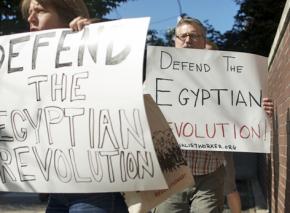Our eyes are on Egypt
rounds up reports from emergency protests across the U.S. that were called in solidarity with the Egyptian Revolution.
WHEN ACTIVISTS heard the news that the Egyptian Revolution was under assault--with the Egyptian Supreme Constitutional Court ruling on the eve of the presidential runoff dissolving the parliament and allowing Ahmed Shafiq, ousted dictator Hosni Mubarak's last prime minister, to remain in the runoff--they quickly organized protests here in the U.S.
On June 14, the Egyptian court--made up of appointees from the Mubarak regime--announced that Shafiq could remain in the election, overturning a law that was intended to bar members of the former dictator's government from running for president. Another ruling invalidated one-third of the elections for seats in Egypt's first democratically elected parliament--most of them held by the Muslim Brotherhood. The military Supreme Council of the Armed Forces (SCAF) will assume legislative authority in its place.
Supporters of the Egyptian struggle--many who took part in protests in support of the Arab Spring a year ago and others inspired by those revolutions during the Occupy movement in their own cities--joined pickets.

In New York City, 30 solidarity activists, including lawyers recently returned from a solidarity delegation to Egypt, turned out for an emergency protest at the Egyptian consulate on June 15 called by the Adhoc Coalition to Defend the Egyptian Revolution the night before.
Protesters underlined the importance of exposing the lies and misinformation of the mainstream media. Many questioned why the Egyptian judges announced their ruling now, just days before the election. Protester Yusef Khalil said:
What's happening in Egypt is happening for the first time in my life, in my parents' lives. We haven't witnesses this kind of movement of people fighting for their rights, for themselves, and getting rid of the dictators supported by the U.S. and who stayed in place because of U.S. support. Not just the dictators supported by the U.S., but other dictators that might have disagreements with the U.S.--we're sick and tired of all of them.
We want our freedom. And we need the support of people in the U.S. We need you to make sure the U.S. government stops supporting dictators in the Middle East, that they stop trying to control the people of the Middle East and let us be free.
There were also three pro-military protesters who were accompanied by representatives of the consulate.
In Chicago, about 30 people picketed at rush hour on June 15 in front of the Egyptian consulate downtown. The rally was called by members of Occupy Chicago and the International Socialist Organization.
At a speak-out, several people recalled the Tunisian and Egyptians uprising more than a year ago that inspired the Arab Spring and subsequent rebellions in the squares of Greece and Spain. An activist with Occupy Chicago said, "Egypt is where it began."
Organizers argued that the fight was far from over, and unlike the media and the U.S. government, activists here were not going to let the Egyptian Revolution disappear.
In Boston, about 30 protesters held a picket and speak-out in solidarity with the Egyptian revolution in Copley Square on June 15.
In Burlington, Vt., 20 people mobilized on June 16 for a speak-out and rally against the counter-revolutionary actions by the Egyptian military and in solidarity with the Egyptian revolution.
Protesters chanted "Hey hey, ho ho, martial law has got to go!" and "We demand real democracy. Not the SCAF. Not hypocrisy!" Speakers, including Egyptian Americans and other local activists, emphasized the importance of building solidarity with the revolution and opposing U.S. support for the Egyptian military.
Next steps involve mobilizing a delegation to the office of senator Patrick Leahy, who has suggested that the dissolution of parliament "throws into question" U.S. aid to Egypt's military.
In Washington, D.C., about a dozen people marched, chanted and spoke out in support of the Egyptian people's revolution in front of the Egyptian embassy on June 15.
Outraged that the Egyptian court had once again placed the military in control of the Egyptian government, protesters marched in front of the embassy's iron gates with signs and chanted, "Down with SCAF, defend the revolution," "Hey, hey! The revolution is here to stay," "Hey Shafiq, we know you--Mubarak was a killer, too," and "They say coup, we say no. Shafiq and SCAF have got to go."
The action ended with activists gathered on the embassy sidewalk to share their reasons for picketing. "We stand with the revolution in its hour of need," said Mike Stark. "Liberals like Sen. Leahy from Vermont are basically instructing the State Department to not touch U.S. military aid to Egypt, even as the generals and thugs of the former regime are moving to disband parliament and to ensure that democracy and the revolution are silenced."
Many spoke of how the January 25 revolution in Tahrir Square inspired them in their own struggles, from the fight to save the life of Troy Davis, to the fight against Republican Gov. Scott Walker in Wisconsin, and the Occupy movement.
"The Egyptian revolution is why I wanted to join Occupy when I moved to D.C.," said Sydney Browning. "It's all a part of the global movement of youth."
"We're out here to let them know that the whole world is watching," said Dave Zirin. "We are watching what they are doing and we're going to make sure that the self determination of the Egyptian people is defended by any means necessary."


